PEP小学六年级上册英语单词和重点句型复习
- 格式:doc
- 大小:26.00 KB
- 文档页数:4

人教PEP版英语六年级上册Unit 1 How can I get there 单元复习(知识梳理+检测)一、重点单词、短语。
science 科学museum 博物馆bookstore 书店cinema 电影院hospital 医院crossing 十字路口turn 转弯left 左straight 笔直地right 右ask问interesting有趣的street 大街restaurant饭店post office 邮局get to 到达turn right 右转next to 靠近in front of 在……前面over there 在那儿far from 离……远on the left 在左边at the first crossing在第一个十字路口turn left 左转go straight 直走on the right 在右二、重点句型。
1. —Where is the museum shop? —博物馆的商店在哪儿?—It’s near the door. —在大门附近。
2. —Where is the science museum? 科学博物馆在哪儿?—It’s near the library. 它在图书馆附近。
3. —How can I get there? 我怎么到那儿?—Turn right at the school. Then go straight. 在学校右转。
然后直走。
4. I want to buy a postcard. 我想买一张明信片。
5. —Where is the cinema? 电影院在哪里?—It’s near the hospital. 它在医院附近。
6. There is a pet hospital in my city. 在我的城市里有一家宠物医院。
7. —How can we get to the hospital? 我们怎么到医院?—Turn left at the cinema. 在电影院左转。
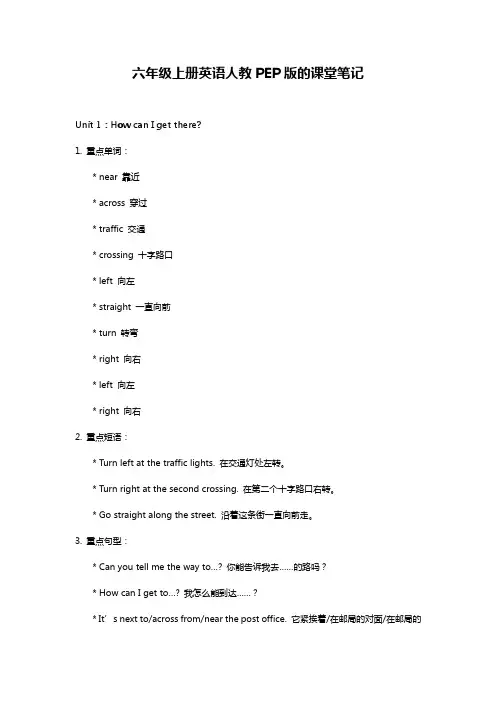
六年级上册英语人教PEP版的课堂笔记Unit 1:How can I get there?1. 重点单词:* near 靠近* across 穿过* traffic 交通* crossing 十字路口* left 向左* straight 一直向前* turn 转弯* right 向右* left 向左* right 向右2. 重点短语:* Turn left at the traffic lights. 在交通灯处左转。
* Turn right at the second crossing. 在第二个十字路口右转。
* Go straight along the street. 沿着这条街一直向前走。
3. 重点句型:* Can you tell me the way to…? 你能告诉我去……的路吗?* How can I get to…? 我怎么能到达……?* It’s next to/across from/near the post office. 它紧挨着/在邮局的对面/在邮局的附近。
4. 语法知识:* 用“Can you tell me the way to…?”和“How can I get to…?”询问道路和交通方式。
* 用“next to/across from/near”等介词表达位置关系。
5. 功能话题:问路和指路,描述位置关系。
6. 文化知识:了解不同国家的交通规则和交通标志。
Unit 2:Where is the science museum?1. 重点单词:* science museum 科学博物馆* library 图书馆* hospital 医院* cinema 电影院* post office 邮局2. 重点短语:* Excuse me. 对不起。
* Thank you very much/a lot. 非常感谢你。
3. 重点句型:- Excuse me, where is the science museum? 对不起,请问科学博物馆在哪里?- It’s next to/across from/near the post office. 它紧挨着/在邮局的对面/在邮局的附近。
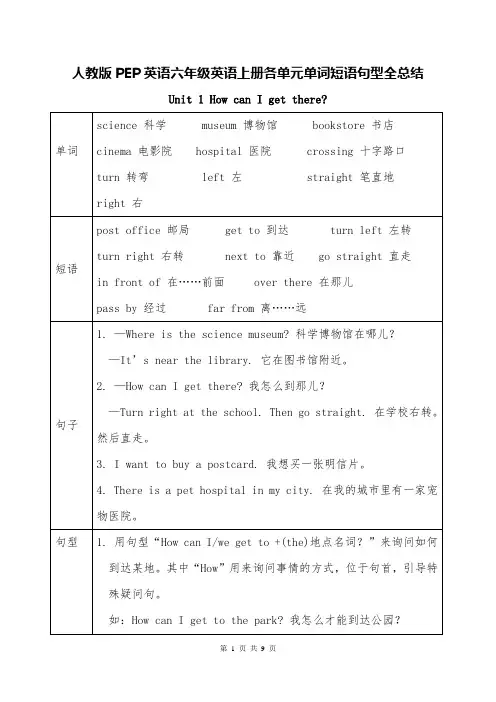
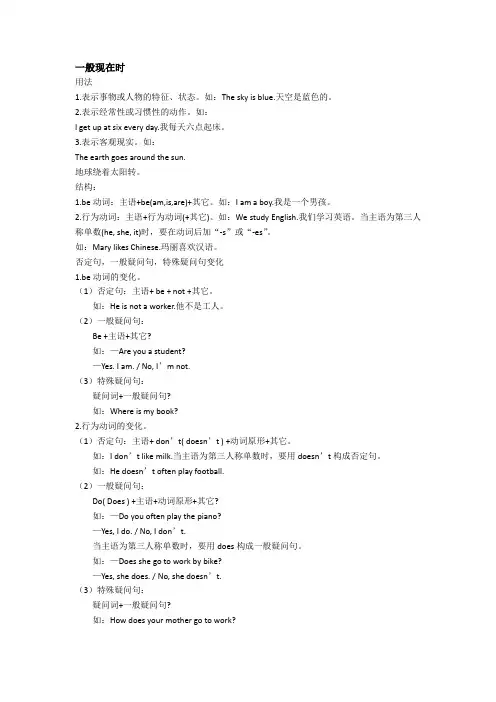
用法1.表示事物或人物的特征、状态。
如:The sky is blue.天空是蓝色的。
2.表示经常性或习惯性的动作。
如:I get up at six every day.我每天六点起床。
3.表示客观现实。
如:The earth goes around the sun.地球绕着太阳转。
结构:1.be动词:主语+be(am,is,are)+其它。
如:I am a boy.我是一个男孩。
2.行为动词:主语+行为动词(+其它)。
如:We study English.我们学习英语。
当主语为第三人称单数(he, she, it)时,要在动词后加“-s”或“-es”。
如:Mary likes Chinese.玛丽喜欢汉语。
否定句,一般疑问句,特殊疑问句变化1.be动词的变化。
(1)否定句:主语+ be + not +其它。
如:He is not a worker.他不是工人。
(2)一般疑问句:Be +主语+其它?如:—Are you a student?—Yes. I am. / No, I’m not.(3)特殊疑问句:疑问词+一般疑问句?如:Where is my book?2.行为动词的变化。
(1)否定句:主语+ don’t( doesn’t ) +动词原形+其它。
如:I don’t like milk.当主语为第三人称单数时,要用doesn’t构成否定句。
如:He doesn’t often play football.(2)一般疑问句:Do( Does ) +主语+动词原形+其它?如:—Do you often play the piano?—Yes, I do. / No, I don’t.当主语为第三人称单数时,要用does构成一般疑问句。
如:—Does she go to work by bike?—Yes, she does. / No, she doesn’t.(3)特殊疑问句:疑问词+一般疑问句?如:How does your mother go to work?一、一般过去时的概念一般过去时表示过去某个时间发生的动作或状态。
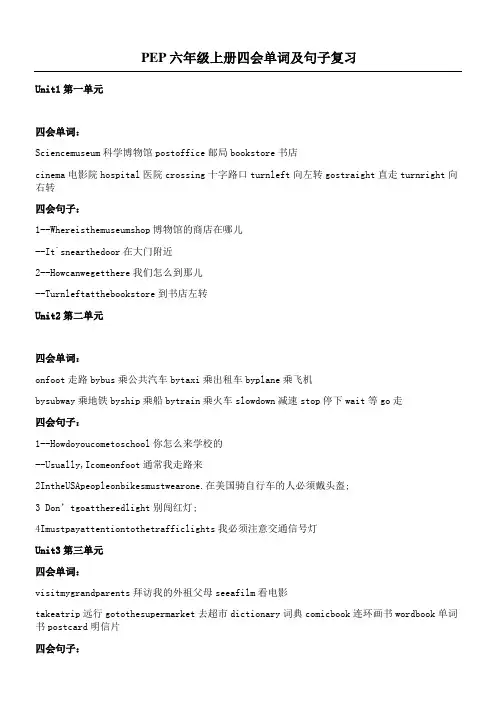
PEP六年级上册四会单词及句子复习Unit1第一单元四会单词:Sciencemuseum科学博物馆postoffice邮局bookstore书店cinema电影院hospital医院crossing十字路口turnleft向左转gostraight直走turnright向右转四会句子:1--Whereisthemuseumshop博物馆的商店在哪儿--It`snearthedoor在大门附近2--Howcanwegetthere我们怎么到那儿--Turnleftatthebookstore到书店左转Unit2第二单元四会单词:onfoot走路bybus乘公共汽车bytaxi乘出租车byplane乘飞机bysubway乘地铁byship乘船bytrain乘火车slowdown减速stop停下wait等go走四会句子:1--Howdoyoucometoschool你怎么来学校的--Usually,Icomeonfoot通常我走路来2IntheUSApeopleonbikesmustwearone.在美国骑自行车的人必须戴头盔;3 Don’tgoattheredlight别闯红灯;4Imustpayattentiontothetrafficlights我必须注意交通信号灯Unit3第三单元四会单词:visitmygrandparents拜访我的外祖父母seeafilm看电影takeatrip远行gotothesupermarket去超市dictionary词典comicbook连环画书wordbook单词书postcard明信片四会句子:1--Whatareyougoingtodotomorrow你明天打算做什么--I’mgoingtohaveanartlesson.我要上美术课2 We’regoingtodrawsomepicturesinRenminPark.我要到人民公园去画画3--Whereareyougoing你们打算去哪儿--We`regoingtothecinema我们打算去电影院4Whenareyougoing你们什么时候去Unit4第四单元四会单词:dancing跳舞singing唱歌readingstories看故事书playingfootball踢足球doingkungfu打功夫cooksChinesefood做中国菜studiesChinese学习汉语doeswordpuzzles猜字谜goeshiking远足四会句子:1--WhatarePeter`shobbies彼得有什么爱好--Helikesreadingstories他喜欢读故事2--DoesheliveinSydney他住在悉尼吗--No,hedoesn`t不,他没有3--Doeshelikedoingwordpuzzlesandgoinghiking他喜欢猜字谜和远足吗--Yes,hedoes是的,他喜欢Unit5第五单元四会单词:factoryworker工厂工人postman邮递员businessman生意人policeofficer警察fisherman渔民scientist科学家pilot飞行员coach教练四会句子:1--Whatdoeshedo他是做什么的--Heisabusinessman.他是商人2--Wheredoeshework他在哪儿工作--Heworksatsea.他在海上工作;3--Howdoeshegotowork他怎么上班--Hegoestoworkbybike.他骑自行车上班;Unit6第六单元四会单词:angry生气的afraid害怕的sad悲伤地worried担心的happy开心的seeadoctor看医生domoreexercise做更多的锻炼takeadeepbreath深深吸一口气wearwarmclothes穿暖和的衣服counttoten数到十四会句子:1 They’reafraidofhim.它们害怕它2Thecatisangrywiththem.这只猫生它们的气;3What`swrong怎么了Yourfatherisill.你爸爸生病了;4Heshouldseeadoctorhismorning.他今天早上应该去看病;5Don`tbesad.别伤心PEP六年级上册常用句型问路和指路-Whereis+地点名词……在哪儿-It’s+介词短语.在……;-Howcanwe/Igetto...我们/我怎么到……呢-Turnleft/right./Gostraight./Youcangoby+交通工具.左/右转;直走;/你可以乘坐……去那儿;询问并回答对方来或去某地的交通方式:Howdoyoucome/goto+地点你/你们怎么来/去……I/Wecome/goto+地点+bybike/onfoot….我/我们骑自行车/步行……来/去……询问对方某个时间打算做某事的句型及答语:-Whatareyougoingtodo+表示将来的时间你……打算去做什么-I’mgoingto+动词原形+将来的时间.我打算……去做……询问对方打算去哪儿的句型及答语:Whereareyougoing+表示将来的时间你……打算去哪儿I’mgoingto+表示地点的名词.我打算……去….询问对方打算什么时候去做某事的句型及答语:Whenareyougoing+动词原形你打算什么时候去……Iamgoingto+动词原形+将来时间.我打算……去……;注:begoingto+动词原形=will+动词原形询问别人的爱好并作出回答:Whatis/are某人的hobby/hobbies……有什么爱好=Whatdo/does某人like主语+like/likes+动词-ing+其他.……喜欢做……=某人的hobby is/are….某人的爱好是...;助动词does引导的一般疑问句及答语:Does+第三人称单数主语+动词原形+其他……做……吗-Yes,he/she/itdoes.No,he/she/itdoesn’t.是的,他/她/它是;不,他/她/它不是;询问他人的职业并作出回答:Whatdo/does+主语+do......是做什么的=Whatbe+某人主语+be动词+a/an+职业名词.……是……询问他人的工作地点并作出回答:Wheredo/does+主语+work……在哪儿工作主语+work/works+表示地点的副词或介词短语;……在……工作;询问他人怎么去上班:Howdo/does+主语+gotowork主语+gotowork+bybike/onfoot….询问他人正在做什么及描述正在做某事:What+be+某人+doing主语+be动词+动词-ing+其他….正在…Don’t祈使句:Don’t+动词原形+其他.不要……Don’t+be+形容词+其他.不要……表达对某人或某事的关心:What’wrongwith+某人描述及提问某人的感受的句型:How+do/does某人+feel主语+feel/feels+表示感受的形容词+其他.=主语+be动词+表示感受的形容词+其他.……是……用should来给对方提建议及征求意见的句型:Whatshould某人+do某人should+动词原形.你应该…..语法复习一、现在进行时态3种变化规律1.直接加ing:do—doing draw—drawing cook—cooking answer—answering read—reading listen—listening fly—flying sing—singing play—playing2.去掉末尾的e加ing:write—writing dance—dancing take—taking have—having make—making ride—riding dive—diving3.双写末尾字母加ing:get—getting run—running swim—swimming sit—sitting put—putting你正在干什么WhatareyoudoingI’mansweringthephone.他/她/它正在干什么Whatishe/she/itdoingHe’s/She’s/It’s …他她、它们正在干什么WhataretheydoingTheyare…看到like或likes后面的动词要加上ing二、一般将来时态begoingto/will+动词原形表示一般将来时的时间状语有:thismorning,thisafternoon,thisevening,tomorrow,tonight,thisweekend,ontheweekend,nextweek,nextmonth,nextyear,nextweekend.例:今晚你将要做什么Whatareyougoingtodothisevening—I’mgoingtothecinema.I’mgoingtovisitmygrandparents.你将什么时候去Whenareyougoing—I’mgoingat7:10.你将怎样去呢Howareyougoing—I’mgoingbybus.今天下午你将要去哪里Whereareyougoingthisafternoon—I’mgoingtothebookstore.你将要买什么呢WhatareyougoingtobuyI’mgoingtobuyacomicbook.你将和谁一起去WhoareyougoingwithI’mgoingwithmyparents.三、第三人称单数后面的动词要加s或es1.一般情况加s,如:read—reads;live—lives;play—plays;sing—sings2.动词末尾以s,x,ch,sh或部分以o结尾的加es记住课本中出现的这几个:watches,teaches,goes,does,washes,passes3.辅音字母+y结尾的把y变i再加es,如:fly—flies;study—studies4.特殊情况:have--has5.第三人称单数包括:he;she;it;myfather/friend;Amy/Hangzhou等一个人名或地名;例如:Helikesdrawingpictures.Sheworksinacarcompany.Itcomesfromtheclouds.Myfathergoestoworkonfoot.LiLeioftenplayscomputergamesafterlunch.6.一般疑问句记住:前面助动词加了es,后面动词就不变化了;如:DoessheteachEnglishDoesyourpenpalliveinHangzhou四、不定冠词a和an的用法a用于辅音因素开头的单词前;an用于元音因素开头的单词前;记住课本中出现的要用an的单词:anactor;anactress;anartist;anengineer;anaccountant;anEnglishbook;anorange;anapple;anoldwoman五、动词变化为表示职业或人的单词1.动词后面加er:work—worker;teach—teacher;sing—singer;TV report—TVreporterclean—cleaner2.动词后面加or:act—actor;doctor3.末尾以e结尾的直接加r:write—writer;dance—dancer;drive—driver4.动词后面加ist:art—artist;tour—tourist5.职业男女有区别的:警察policeman—policewoman;演员actor—actress六、8个疑问词which哪一个what什么when什么时候where哪里whose谁的why为什么how怎么样who谁七、人称代词和物主代词I—my-mine我—我的-我的you—your-yours你;你们—你的;你们的-你的;你们的he—his-his他—他的-他的she—her-hers她—她的-她的we—our-ours我们—我们的-我们的they—their-theirs他们/她们/它们—他们的/她们的/它们的他们的/她们的/它们的八、can后面加动词原形WhatcanyoudoIcancookthemeals.Hecanflykites.Shecan playtheviolin.弹小提琴PEP小学英语六年级上册各单元作文一、介绍你和家人上学或上班的方式Igotoschoolonfoot.Mysistergoestoschoolonfoot,too.Mybrothergoestoschoolby bike.Myfathergoestoworkbycar.Mymothergoestoworkbybike.二、看图,说说你怎样去电影院Igotothecinema.Istartfromhere.Gostraightforfiveminutes.Thenturnleftatthe library.Gostraightforoneminute.Thelibraryisontheright.三、读读下周末你和朋友的计划I’mgoingtohaveabusyweekendwithmyfriends.OnSaturdaymorning,wearegoingtog oshpping.OnSaturdayafternoon,wearegoingtothepark.OnSundaymorning,wearego ingtogofishing.OnSundayafternoon,wearegoingtoflykites.Wewillbehappy.四、说说你和你家人的爱好;Ilikeflyingkites.Myfatherlikesdiving.Mymotherlikesplayingthepipa.Mybroth erlikesridingabike.Mysisterlikeslisteningtomusic.MyfriendJohnlikesflying kites.Amylikescollectingstamps.ZhangPenglikesplayingfootball.ChenJielike sridingabike.五、介绍你一家人的职业和上班地点和方式;Myfatherisateacher.Heworksinaschool.Hegoestoworkbycar.Mymotherisanaccoun tant.Sheworksinabank.Shegoestoworkbybus.六、写一封信给你的笔友,介绍你一家人的情况;DearAmy,MynameisSarah.I’m13.I’mtallandthin.Ilikeswimming.Myfatheris40.He’stal landstrong.Helikesreadingbooks.Heisworker.Heworksinafactory.Hegoestowork bycar.M ymotheris39.She’sshortandthin.Shelikescooking.Sheworksinabooksto re.Shegoestoworkonfoot.Yours,Sarah七、看图介绍图中这个人的情况;HeisBen.Heis26.Heisapoliceman.Hegoestowork bybus.Helikesplayingtheviolin.Helikesgoingfishing,too.。
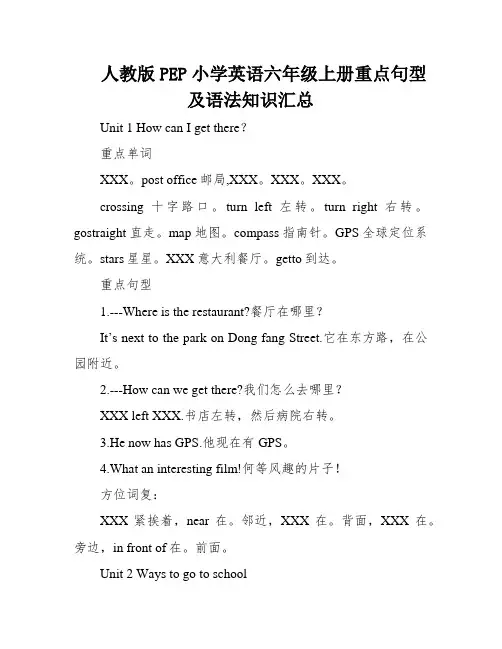
人教版PEP小学英语六年级上册重点句型及语法知识汇总Unit 1 How can I get there?重点单词XXX。
post office邮局,XXX。
XXX。
XXX。
crossing十字路口。
turn left左转。
turn right右转。
gostraight直走。
map地图。
compass指南针。
GPS全球定位系统。
stars星星。
XXX意大利餐厅。
getto到达。
重点句型1.---Where is the restaurant?餐厅在哪里?It’s next to the park on Dong fang Street.它在东方路,在公园附近。
2.---How can we get there?我们怎么去哪里?XXX left XXX.书店左转,然后病院右转。
3.He now has GPS.他现在有GPS。
4.What an interesting film!何等风趣的片子!方位词复:XXX紧挨着,near在。
邻近,XXX在。
背面,XXX在。
旁边,in front of在。
前面。
Unit 2 Ways to go to school重点单词on foot走路。
by bike骑车。
by bus乘公交。
by train乘火车。
XXX乘地铁。
by ship搭船。
by XXX乘飞机。
slow down 慢下来。
XXX交通灯。
traffic rules交通划定规矩。
go/come to school上学。
by sled坐雪橇。
byferry坐轮渡。
pay n to留意。
traffic lights交通灯。
and wait at a red light红灯停等一等。
slow downand。
at a yellow light黄灯减速并停下。
Go XXX。
重点句型1.---How do you come to school?你怎么上学?----Usually。
I come on foot.通常我走路来的。
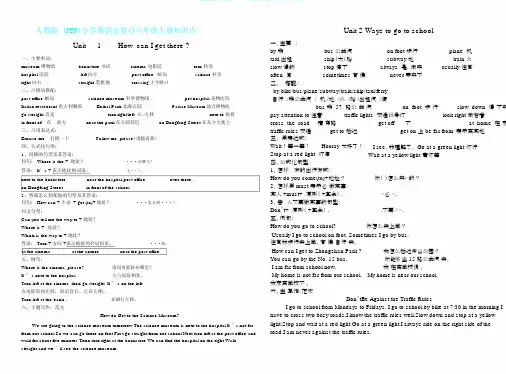
人教版 (PEP)小学英语总复习六年级上册知识点Unit1How can I get there ?一、主要单词:museum 博物馆bookstore 书店cinema 电影院turn 转弯hospital 医院left 向左post office邮局science 科学right 向右straight 笔挺地crossing 十字路口二、习惯语搭配:post office 邮局science museum 科学博物馆pet hospital 宠物医院Italian restaurant 意大利餐馆Beihai Park 北海公园Palace Museum 故宫博物院go straight 直走turn right/left 右 /左转next to 挨着in front of... 在 ...前方near the park 在公园邻近on Dongfang Street 在东方大街上三、习用表达式:Unit 2 Ways to go to school一、主要:by 乘bus 公共汽on foot 步行plane 机taxi 出租ship(大)船subway 地train 火slow 慢的stop 停下always 是,向来usually 往常often 常sometimes 有候never 素来不二、搭配:by bike/bus/plane/subway/train/ship/taxi/ferry自行 /乘公共汽 / 机 /地 /火 /船 /出租汽 /渡bus 乘 57 路公共汽on foot 步行slow down 慢下来pay attention to 注意traffic lights 交通讯号灯look right 向右看cross the road横穿路get off下at home 在家traffic rules 交通get to 抵达get on 上be far from⋯表示离某地Excuse me打搅一下Follow me, please! 请随着我!四、公式化句型:1、问路的句型及其答语:问句: Where is the + 地址?···在哪儿?答语: It’s + 表示地址的词语。
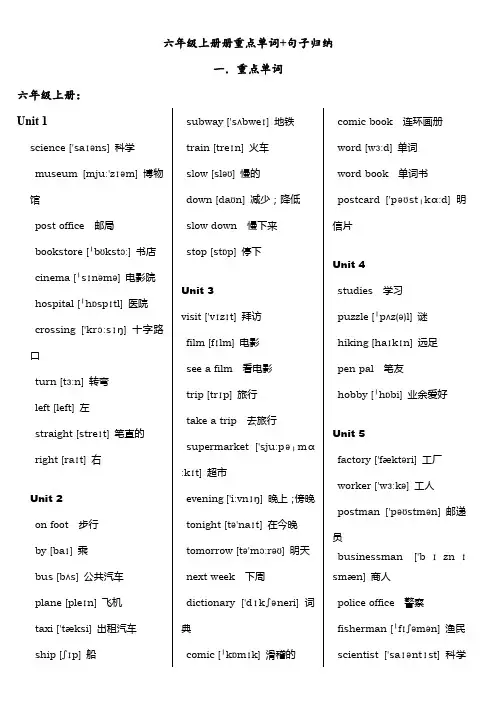
六年级上册册重点单词+句子归纳一.重点单词六年级上册:Unit 1science ['saɪəns] 科学museum [mjuː'zɪəm] 博物馆post office 邮局bookstore [ˈbʊkstɔː] 书店cinema [ˈsɪnəmə] 电影院hospital [ˈhɒspɪtl] 医院crossing ['krɔːsɪŋ] 十字路口turn [tɜːn] 转弯left [left] 左straight [streɪt] 笔直的right [raɪt] 右Unit 2on foot 步行by [baɪ] 乘bus [bʌs] 公共汽车plane [pleɪn] 飞机taxi ['tæksi] 出租汽车ship [ʃɪp] 船subway ['sʌbweɪ] 地铁train [treɪn] 火车slow [sləʊ] 慢的down [daʊn] 减少;降低slow down 慢下来stop [stɒp] 停下Unit 3visit ['vɪzɪt] 拜访film [fɪlm] 电影see a film 看电影trip [trɪp] 旅行take a trip 去旅行supermarket ['sjuːpəˌmɑːkɪt] 超市evening ['iːvnɪŋ] 晚上;傍晚tonight [tə'naɪt] 在今晚tomorrow [tə'mɔːrəʊ] 明天next week 下周dictionary ['dɪkʃəneri] 词典comic [ˈkɒmɪk] 滑稽的comic book 连环画册word [wɜːd] 单词word book 单词书postcard ['pəʊstˌkɑːd] 明信片Unit 4studies 学习puzzle [ˈpʌz(ə)l] 谜hiking [haɪkɪn] 远足pen pal 笔友hobby [ˈhɒbi] 业余爱好Unit 5factory ['fæktəri] 工厂worker ['wɜːkə] 工人postman ['pəʊstmən] 邮递员businessman ['bɪznɪsmæn] 商人police office 警察fisherman [ˈfɪʃəmən] 渔民scientist ['saɪəntɪst] 科学家pilot [ˈpaɪlət] 飞行员coach [kəʊtʃ] 教练Unit 6angry ['æŋgri] 生气的afraid [ə'freɪd] 害怕sad [sæd] 难过的worried ['wʌrɪd] 担心的;发愁的happy ['hæpi] 高兴的see a doctor 看病wear [weə] 穿more [mɔː] 更多的deep [diːp] 深的breath [breθ] 呼吸take a deep breath 深呼吸count [kaʊnt] 数数count to ten 数到十六年级下册Unit 1younger [ˈjʌŋɡə] 更年轻的(young)older 更年长的(old)taller 更高的(tall)shorter 更矮的;更短的longer 更长的(long)thinner 更瘦的(thin)heavier 更重的(heavy)bigger 更大的(big)smaller 更小的(small)stronger 更强壮的(strong)Unit 2cleaned 打扫(clean的过去式)stayed 停留;呆(stay)washed 洗(wash)watched 看(watch)had [hæd] 患病;得病(have)had a cold 感冒slept 睡觉(sleep)read [riːd] 读(read)saw [sɔː] 看见(see)last [lɑːst] 最近的;上一个的yesterday ['jestədi] 昨天before [bɪ'fɔː] 在……之前Unit 3went [went] 去(go)camp [kæmp] 野营went camping 野营fish [fɪʃ] 钓鱼went fishing 去钓鱼rode [rəʊd] 骑hurt [hɜːt] 受伤(hurt)ate [eɪt] 吃(eat)took [teɪk] 拍照(take)took pictures 照相bought [bɔːt] 买(buy)gift [ɡɪft] 礼物Unit 4dining hall 饭厅grass [grɑːs] 草坪gym [dʒɪm] 体育馆ago [ə'gəʊ] 以前cycling [ˈsaɪklɪŋ] 骑自行车运动go cycling 去骑自行车ice-skate 滑冰badminton [ˈbædmɪntən]羽毛球运动二.重点句型六年级上册1. How do you go to school, Sarah? ------- Usually I go to school on foot. Sometimes I go by bike.你怎样去上学的,萨拉? 我经常步行去上学.有时候骑自行车去.2. How can I get to Zhongshan Park? ------ You can go by the No.15 bus.我怎样能到达中山公园? 你可以坐十五路公共汽车去.3. Where is the cinema, please? ------ It’s next to the hospital.请问电影院在哪? 它在医院的旁边.4. Turn left at the cinema, then go straight. It’s on the left.在电影院那左转,然后直走.它就在左边.5. What are you going to do on the weekend? ------ I’m going to visit my grandparents this weekend.你周末打算去做什么? 我这个周末打算去看望我的爷爷奶奶.6. Where are you going this afternoon? ------ I’m going to the bookstore.你今天下午打算去哪? 我打算去书店.7. What are you going to buy? ------ I am going to buy a comic book.你打算去买什么? 我打算去买一本漫画书.8. What is your hobby? ------ I like collecting stamps. He likes collecting stamps,too.你的爱好是什么? 我喜欢收集邮票. 他也喜欢收集邮票.9. Does she teach English? ------ No, she doesn’t. ------ Yes, she does.她教英语吗? 不,她不是. 是的,她是.10. What does your mother do? ------ She is a TV reporter.你妈妈是做什么的? 她是一个电视台记者.11. Where does she work? How does she go to work?她在哪工作? 她怎样去工作的?12. Where does the rain come from? ------ It comes from the clouds.雨来自哪里? 它来自云.13. How do you do that? What should you do then?你是怎样做的. 然后你应该做什么?六年级下册1. How tall are you? ------ I’m 164 cm tall.你有多高? 我164厘米高.You’re shorter than me. You’re 4 cm taller than me.你比我矮. 你比我高4厘米.2. How heavy are you? ------ I’m 48 kg. I’m thinner than you, and shorter.你有多重? 我48千克.我比你要更瘦,更矮.3. What’s the matter? ------ My throat is sore. My nose hurts.怎么了? 我的喉咙痛.我的鼻子不舒服.4. How are you, Liu Yun? You look so happy.你怎么了,刘云? 你看起来很高兴.How are you, Sarah? You look sad today.你怎么了,萨拉?你今天看起来很伤心.5. What did you do last weekend? ------ I played football.你上周末在做什么? 我在踢足球.6. Did you read books? ------ Yes, I did. ------ No, I didn’t.你看过书了吗? 是的,我是. 不,我没有.7. Where did you go on your holiday? ------ I went to Xinjiang.你假期去了哪? 我去了新疆.8. How did you go there? ------ I went by train.你怎样去的? 我乘火车去的.。
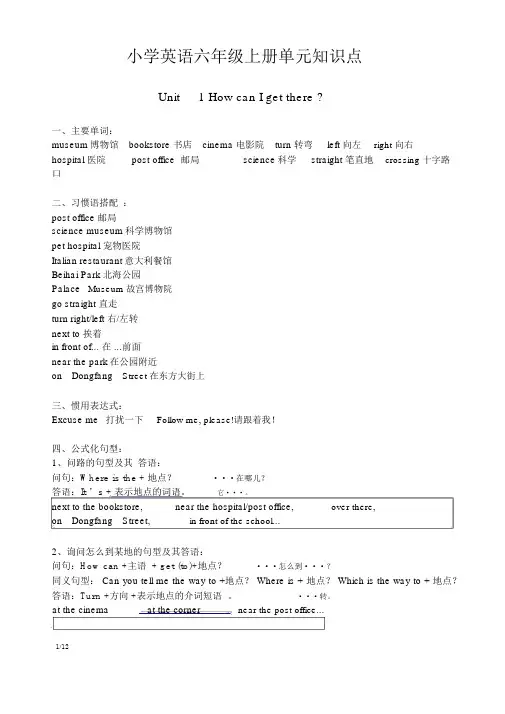
小学英语六年级上册单元知识点Unit 1 How can I get there ?一、主要单词:museum博物馆bookstore 书店cinema 电影院turn 转弯left 向左right 向右hospital 医院post office 邮局science科学straight 笔直地crossing 十字路口二、习惯语搭配:post office 邮局science museum科学博物馆pet hospital 宠物医院Italian restaurant意大利餐馆Beihai Park 北海公园Palace Museum 故宫博物院go straight 直走turn right/left 右/左转next to 挨着in front of... 在 ...前面near the park在公园附近on Dongfang Street 在东方大街上三、惯用表达式:Excuse me打扰一下Follow me, please!请跟着我!四、公式化句型:1、问路的句型及其答语:问句:Where is the + 地点?···在哪儿?答语:It ’s + 表示地点的词语。
它···。
next to the bookstore,near the hospital/post office,over there,on Dongfang Street,in front of the school...2、询问怎么到某地的句型及其答语:问句:How can +主语 + get (to)+地点?···怎么到···?同义句型: Can you tell me the way to +地点? Where is + 地点? Which is the way to + 地点?答语:Turn +方向 +表示地点的介词短语。
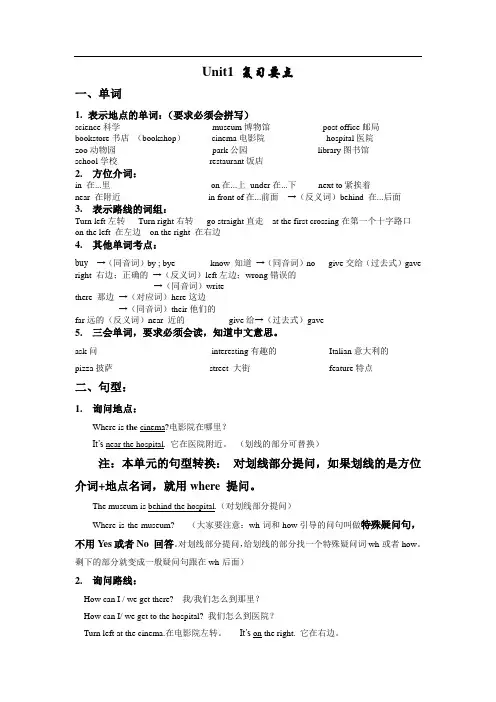
Unit1 复习要点一、单词1.表示地点的单词:(要求必须会拼写)science科学museum博物馆post office邮局bookstore书店(bookshop)cinema电影院hospital医院zoo动物园park公园library图书馆school学校restaurant饭店2.方位介词:in 在...里on在...上under在...下next to紧挨着near 在附近in front of在...前面→(反义词)behind 在...后面3.表示路线的词组:Turn left左转Turn right右转go straight直走at the first crossing在第一个十字路口on the left 在左边on the right 在右边4.其他单词考点:buy →(同音词)by ; bye know 知道→(同音词)no give交给(过去式)gave right 右边;正确的→(反义词)left左边;wrong错误的→(同音词)writethere 那边→(对应词)here这边→(同音词)their他们的far远的(反义词)near 近的give给→(过去式)gave5.三会单词,要求必须会读,知道中文意思。
ask问interesting有趣的Italian意大利的pizza披萨street 大街feature特点二、句型:1.询问地点:Where is the cinema?电影院在哪里?It’s near the hospital. 它在医院附近。
(划线的部分可替换)注:本单元的句型转换:对划线部分提问,如果划线的是方位介词+地点名词,就用where 提问。
The museum is behind the hospital.(对划线部分提问)Where is the museum? (大家要注意:wh-词和how引导的问句叫做特殊疑问句,不用Yes或者No 回答。
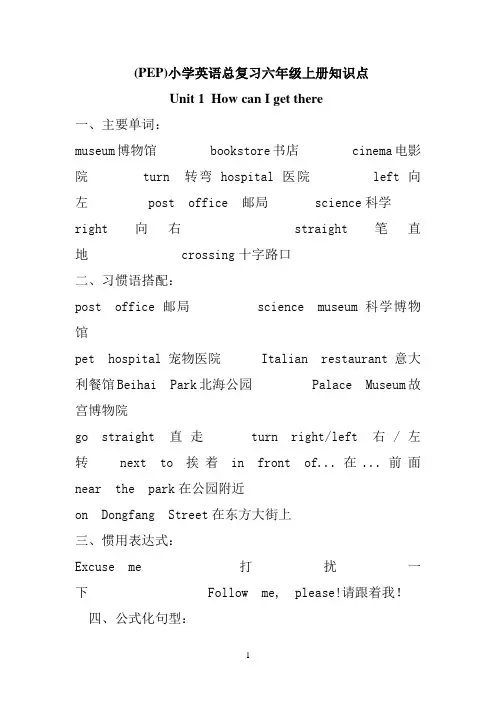
(PEP)小学英语总复习六年级上册知识点Unit 1 How can I get there一、主要单词:museum博物馆bookstore书店cinema电影院turn 转弯hospital医院left向左post office 邮局science科学right向右straight笔直地crossing十字路口二、习惯语搭配:post office邮局science museum科学博物馆pet hospital宠物医院Italian restaurant意大利餐馆Beihai Park北海公园 Palace Museum故宫博物院go straight直走turn right/left右/左转next to挨着in front of...在...前面near the park在公园附近on Dongfang Street在东方大街上三、惯用表达式:Excuse me 打扰一下Follow me, please!请跟着我!四、公式化句型:1、问路的句型及其答语:问句:Where is the + 地点······在哪儿答语:It's + 表示地点的词语(next to the bookstore,near the hospital/post office, over there,on Dongfang Street, infront of the school... )2、询问怎么到某地的句型及其答语:问句:How can +主语+ get (to)+地点·····怎么到·····同义句型:Can you tell me the way to +地点Where is + 地点Which is the way to +地点五、例句:Where is the cinema, please 请问电影院在哪里It's next to the hospital.它与医院相邻。
精心整理人教版(PEP)小学英语总复习六年级上册知识点Unit1Howcan I getthere? 一、主要单词:museum 博物馆bookstore 书店cinema 电影院turn 转弯:sciencemuseum talianrestaurantExcuseme 打扰一下 1Whereisthe+nexttothebookstore,nearthehospital/postoffice,overthere,I t’s+表示地点的词语。
它···。
2Howcan+主语+get(to)+the+Canyoutellmethewayto+Whereis+Whichisthewayto+Turn+方向+表示地点的介词短语。
atthecinemaatthecornernearthepostoffice...Whereisthecinema,please?I t’snexttothehospital.它与医院相邻。
Turnleftatthecinema,thengostraight.I t’sontheleft.在电影院向1、Whereisthemuseumshop?博物馆商店在哪里?I t’snearthedoor.他在门附近。
2、Whereisthepostoffice?邮局在哪里?I t’snexttothemuseum.它与博物馆相邻。
3、Whereistherestaurant?餐馆在哪里?I t’snexttothetheparkonDongfangStreet.它与东方街上的公园相邻。
Unit2Waystogotoschoolby乘bus公共汽车onfoot步行plane飞机taxi出租车ship subway地铁train火车slow慢的stop停下always usually通常often经常sometimes有时候never从来不,永不Wait Hooray I see.绿灯行Stopataredlight红灯停Waitatayellowlight1Howdoyoucome(to)+2、如何用must某人+must++.···必须···。
PEP小学六年级上册英语期中知识点复习Unit1on foot 走路by bike骑车by bus 乘公交by train 乘火车by subway乘地铁by ship 乘船by plane 乘飞机traffic light 交通灯traffic rule 交通规则go to school 上学stop 停止wait等待get to 到达Stop at a red light 红灯停Wait at a yellow light 黄灯等 Go at a green light 绿灯行Unit 2library图书馆post office 邮局hospital医院 cinema 电影院bookstore书店turn left 左转turn right 右转 go straight直走 where 在哪里please 请then 然后next to与……相邻science museum 科学博物馆north北south南west 西east 东Unit3this morning (今天早上) this afternoon (今天下午) this evening (今天晚上) next week (下周)post card (明信片 ) comic book (漫画)newspaper (报纸) buy(购买)take a trip (旅游)read a magazine (看杂志) go to the cinema (看电影) tomorrow (明天) tonight (今晚) magazine (杂志) dictionary(字典) theme park (主题公园)the Great Wall(长城)shoe store(鞋店)fruit stand (水果摊)pet shop (宠物店)Unit4hobby爱好what什么ride a bike → rid ing a bike 骑自行车play the vio lin→play ing the violin拉小提琴dive→div ing跳水collect stamps→collect ing stamps 集邮make kites→mak ing kites制作风筝go→go es去t each→teach es教watch→watch es看read→read s看、读live → live s居住go to work 去上班doesn’t = does not不Unit5singer 歌手 actor男演员actress女演员artist画家TV reporter 电视台记者writer 作家engineer工程师accountant会计policeman男警察salesperson销售员cleaner 清洁工 work工作car company汽车公司factory工厂help帮助Unit 6rain雨cloud 云 sun太阳 stream河,溪 come from 来自plant植物,种植seed种子soil土壤sprout苗,芽should应该then然后vapour水蒸气Unit11.---How do you go to school? 你怎么去上学?---Usually I go to school on foot. Sometimes I go by bus.2.---How can I get to Zhongshan Park ?我怎么到达中山公园?---You can go by the No. 15 bus.Unit21.—Where is the cinema, please? 请问,电影院在哪儿?—It’s next to the hospital.它在医院旁。
最新人教版六年级英语上册单词表(附音标)及重点句子(翻译)Unit 1science['saɪəns] 科学museum [mjuː'zɪəm] 博物馆post office [pəʊst 'ɒfɪs] 邮局bookstore ['bʊkstɔː]书店cinema ['sɪnəmə] 电影院hospital ['hɒspɪt(ə)l] 医院crossing ['krɒsɪŋ]十字路口turn [tɜːn]转弯left [left]左转straight [streɪt]笔直地right [raɪt] 右转ask [ɑːsk]问sir [sɜː]先生interesting ['ɪntrəstɪŋ]有趣的Italian [ɪˈtæljən] 意大利的restaurant [ˈr estərɒnt] 餐馆pizza ['piːtsə] 披萨饼street[striːt]街道get [get] 到达GPS定位系统gave[ɡeɪv](give的过去式)feature ['fiːtʃə] 特点follow ['fɒləʊ] 跟着far [fɑː]远tell [tel] 告诉next to 与......相邻near在......附近Unit 2on foot步行by [baɪ] 经,乘bus [bʌs]公共汽车plane [pleɪn] 飞机taxi['tæksɪ] 出租车ship [ʃɪp] 大船subway ['sʌbweɪ] 地铁slow [sləʊ] 慢的down [daʊn] 减少;降低slow down减速train [treɪn] 火车重点句子(翻译)Unit1Where is the cinema?翻译:It’s next to the bookstore.翻译:How can I get there?翻译:Turn left at the bookstore.翻译:Turn right at the hospital.翻译:Unit2Stop and wait at a red light翻译:Slow down and stop at a yellow light.翻译:Go at a green light.翻译:How do you go to school?翻译:Usually, I go on foot.翻译:In the USA people on bikes must wear one. 翻译:Don't go at the red light!翻译:I must pay attention to the traffic lights! 翻译:Unit3visit my grandparents翻译:What are you going to do tomorrow?翻译:I'm going to have an English lesson.翻译:We're going to cook in Renmin Park.翻译:Where are you going?翻译:We're going to the cinema.翻译:When are you going?翻译:Unit4What are your hobbies?翻译:What are Peter's hobbies?翻译:He likes reading stories.翻译:Does he live in China?翻译:No, he doesn't.翻译:Does he like doing word puzzles and going hiking? 翻译:Yes, he does.翻译:Unit5What does he do?翻译:He is a student.翻译:He's a businessman.翻译:Where does he work?翻译:He works at sea.翻译:How does he go to work?翻译:He goes to work by bike翻译:Unit6take a deep breath 翻译:What's wrong?翻译:I am happy.翻译:He is sad.翻译:She is angry.翻译:We are worried. 翻译:Your father is ill. 翻译:Don't be sad.翻译:Don't worry.翻译:。
六年级上册英语pep单词和重点句子六年级上册英语Pep单词和重点句子主要是为了帮助学生掌握本学期所学的英语词汇和句型,以便能够更好地理解和运用英语进行交流。
下面将详细介绍这些单词和句子。
一、单词部分1. animal(动物)例句:I like animals, especially cats and dogs.(我喜欢动物,尤其是猫和狗。
)2. elephant(大象)例句:Elephants are the largest land animals.(大象是最大的陆地动物。
)3. monkey(猴子)例句:The monkey is swinging on the tree.(猴子正在树上荡秋千。
)4. lion(狮子)例句:The lion is the king of the jungle.(狮子是丛林之王。
)5. tiger(老虎)例句:The tiger has black stripes on its body.(老虎的身上有黑色的条纹。
)6. rabbit(兔子)例句:The rabbit is eating carrots in the garden.(兔子在花园里吃胡萝卜。
)7. turtle(乌龟)例句:The turtle is swimming in the pond.(乌龟正在池塘里游泳。
)8. crocodile(鳄鱼)例句:The crocodile has a long tail and sharp teeth.(鳄鱼有长长的尾巴和锋利的牙齿。
)9. kangaroo(袋鼠)例句:Kangaroos have strong hind legs and a long tail.(袋鼠有强壮的后腿和一条长尾巴。
)10. dolphin(海豚)例句:Dolphins are very intelligent and friendly animals. (海豚是非常聪明友善的动物。
1.Where 在哪里?----回答地点。
Where is the museum shop? 博物馆商店在哪里? -- It’s near the door. 在门的旁边。
Where is the post office? 邮局在哪里? --It’s next to the bookstore. 在书店旁边。
Where are you going this weekend ? 这个周末你打算去哪里?--I’m going to the cinema. 我打算去电影院。
Where is Amy going this weekend ? 这个周末Amy打算去哪里?--She is going to the supermarket. 她打算去超市。
Where does he work? 他在哪里工作? --He works at sea. 他在海边工作。
Where does your mother work? 你妈妈在哪里上班?--She works in a factory.2. Wha t 什么?----打算干什么?爱好是什么?职业是什么?What are you going to do today? 你今天要做什么?--I’m going to see a film. What is Amy going to do this weekend? Amy这周末要做什么? (Wha t提问干什么) She is going to visit her grandparents. 她要去拜访她的爷爷奶奶。
单数:What is your hobby? 你的爱好是什么? -I like swimming. 我喜欢游泳。
复数:What are your hobb ies ?你的爱好是什么? -I like reading stories.我喜欢阅读。
What are her hobbies? 她的爱好是什么? -She like s singing and dancing.What are his hobbies? 他的爱好是什么?-He like s playing football.What are Peter’s hobbies? --He like s going hiking. 他喜欢去远足。
人教PEP 版丨六年级英语上册知识点预习总览(单词、句型、重点短语)Unit 1How can I get there?library 图书馆post office 邮局hospital 医院turn left 左转turn right 右转places:cinema 电影院(地点)bookstore 书店science museum 科学博物馆go straight 直行pet hospital 宠物医院school 学校supermarket 超市crossing 十字路口shoe store 鞋店Italian restaurant 意大利餐馆问路的重点句型:1.Where is the cinema,please?请问电影院在哪儿?next to the bookstore 紧挨着书店in front of the school.在学校的前面.behind the park 在公园的后面It’s near the zoo.在动物园的附近.on Dongfang Street 在东方大街上over there 在那边2.Excuse me,is there a cinema near here ?请问这附近有电影院吗?Yes,there is./No,there isn’t.有./没有。
3.How can I get to the hospital?我该怎样到达医院呢?How can I /we get there ?我/我们怎样到那?回答Turn right/left at the …在…地方向右/左转.或Go straight 向前直走.或You can take the No.31bus.你可乘坐31路公交车去。
4.Is it far from here?离这儿远吗?Yes,it is./No,it isn’t.是的很远/不是很远。
Unit 2Ways to go to school(一)、词汇四会bike (自行车)by (乘坐)slow down 慢下来bus (公共汽车)foot (脚)stop 停下来train (火车)how (怎样)plane (飞机)go to school (上学)ship (轮船)taxi 出租车ferry 轮渡sled 雪橇subway (地铁)(交通工具前加by ,表示乘坐,但步行要用on foot )(二)、重点句型①询问交通方式用疑问代词how——How do you go/come to school ?你怎样去/来上学?——I go/come to school on foot .我走路去/来上学。
PEP小学六年级上册英语单词和重点句型复习
一、单词
UNIT 1
by plane by ship on foot by bike by bus by train by subway traffic lights traffic rules 乘飞机乘船步行骑自行车乘巴士乘火车乘地铁交通灯交通规则
UNIT 2
library post office hospital cinema bookstore science museum north
图书馆邮局医院电影院书店科学博物馆北south west east turn left turn right go straight
南西东转左转右直走
UNIT 3
take a trip read a magazine go to the cinema tomorrow tonight this morning
旅游看杂志看电影明天今晚今天早上this afternoon this evening next week post card magazine
今天下午今天晚上下周明信片杂志
dictionary comic book newspaper
字典漫画书报纸
UNIT4
riding a bike diving playing the violin collecting stamps making kites
骑自行车跳水拉小提琴收集邮票制作风筝
lives in Beijing teaches English goes to work watches TV reads newspapers
居住在北京教英语去上班看电视看报纸
UNIT 5
singer writer TV reporter actor actress artist engineer
歌手作家电视台记者男演员女演员画家工程师
accountant policeman salesperson cleaner
会计男警察售货员清洁工
UNIT 6
rain stream cloud sun vapour seed soil sprout plant
雨小溪云太阳蒸汽种子土壤幼苗植物
二、句子
UNIT 1
1.How do you go to school, Sarah?
2. Usually I go to school on foot. Sometimes I go by bike.
3.Stop at a red light. Wait at a yellow light. Go at a green light.
4.How can I get to Zhongshan Park? You can go by the No.15 bus.
UNIT 2
1.Where is the cinema,please? It’s next to the hospital.
2.Turn left at the cinema, then go straight. It’s on the left.
UNIT 3
1. What are you going to do on the weekend? I’m going to visit my grandparents this weekend.
2 Where are you going this afternoon? I’m going to the bookstore.
3.What are you going to buy? I am going to buy a comic book.
UNIT4
1. What’s your hobby? I like collecting stamps. He likes collecting stamps, too.
2. Does she teach English? No, she doesn’t. Yes, she does.
UNIT 5
1. What does your mother do? She is a TV reporter.
2. Where does she work? How does she go to work?
UNIT 6
1.Where does the rain come from? It comes from the clouds.
2.How do you do that? What should you do then?
六年级上(PEP7)四会单词和句子单元复习卷
Unit 1
将单词或短语补充完整,并写出中文意思。
on foo_ by b_k_ by b_s by tr_ _n
tr_ff_ _ l_g_t tr_ff_ _ r_l_ w_ _t st_ p
---How(怎样) do you go to school, Sarah?
---Ususlly I go to school on foot. Sometimes I go by bike.
---How can I get to Zhongshan Park?
---You can go by the No.15 bus.
Unit 2。